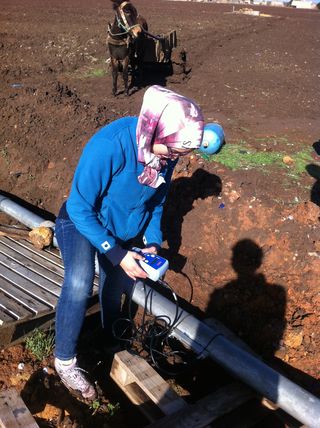The research thesis takes place in the Berrechid plain in Morocco, in the city of Ouled Zidane. This plain is one of the main cereal production area on a national scale, most of which is conducted in rain fed conditions. Since the 1980s, we have seen the emergence of irrigated agriculture, based on groundwater, which is mainly oriented towards market gardening (potatoes, carrots, artichokes, red beetroot, onions, cabbage). The development of this irrigated agriculture is accompanied by a significant decrease in the piezo metric level of the water table. According to the Chaouia-Boureg Basin Agency (ABHCB), the water balance deficit has increased from 20 million m3/year in 2010 to 30 million m3/year in 2016. Groundwater withdrawals through about 3000 access points are estimated at 78 million m3/year, 96% of which concern the agricultural sector (ABHCB, 2017). In addition to the quantitative aspects, analyses of the water of the Berrechid groundwater, carried out at the level of 70% of all control wells, show worrying nitrate levels that exceed the admissible value (50 mg/l). These high concentrations indicate that significant amounts of nitrogen fertilizer are leaching into groundwater. (El Asslouj, Kholtei, El Amrani-Paaza, & Hilali, 2007).
Faced with this quantitative overexploitation combined with the degradation of the quality of the resource, the institutions and organizations in charge of water management declare the control of groundwater use as a priority with regard to the socio-economic challenges they represent in order to ensure the sustainability of agriculture. A groundwater contract is being developed by ABHCB, which focuses on promoting participatory and sustainable groundwater management involving various stakeholders, including users. Our research approach is thus based on the concept of governance of this common good to offer a pragmatic and analytical vision of observable situations, taking into account the need to understand the complexity of triangular management (users, institutional and regulatory framework and technical aspects). This thesis attempts to analyze the different options for water demand management. It is based on four areas of research. First, it is necessary to observe and understand agricultural dynamics at the study area level, then to deepen the study of groundwater uses related to agricultural dynamics, then to reveal and analyze farmers' perceptions of the groundwater and uses, finally to analyze the process of setting up the groundwater contract, as a governance tool, between uses and perceptions.
Keywords: Groundwater, Irrigated agriculture, Overexploitation, Governance
 |
| © Fatah Ameur - Irrigation water flow measurement, Berrechid plain, Morocco |






